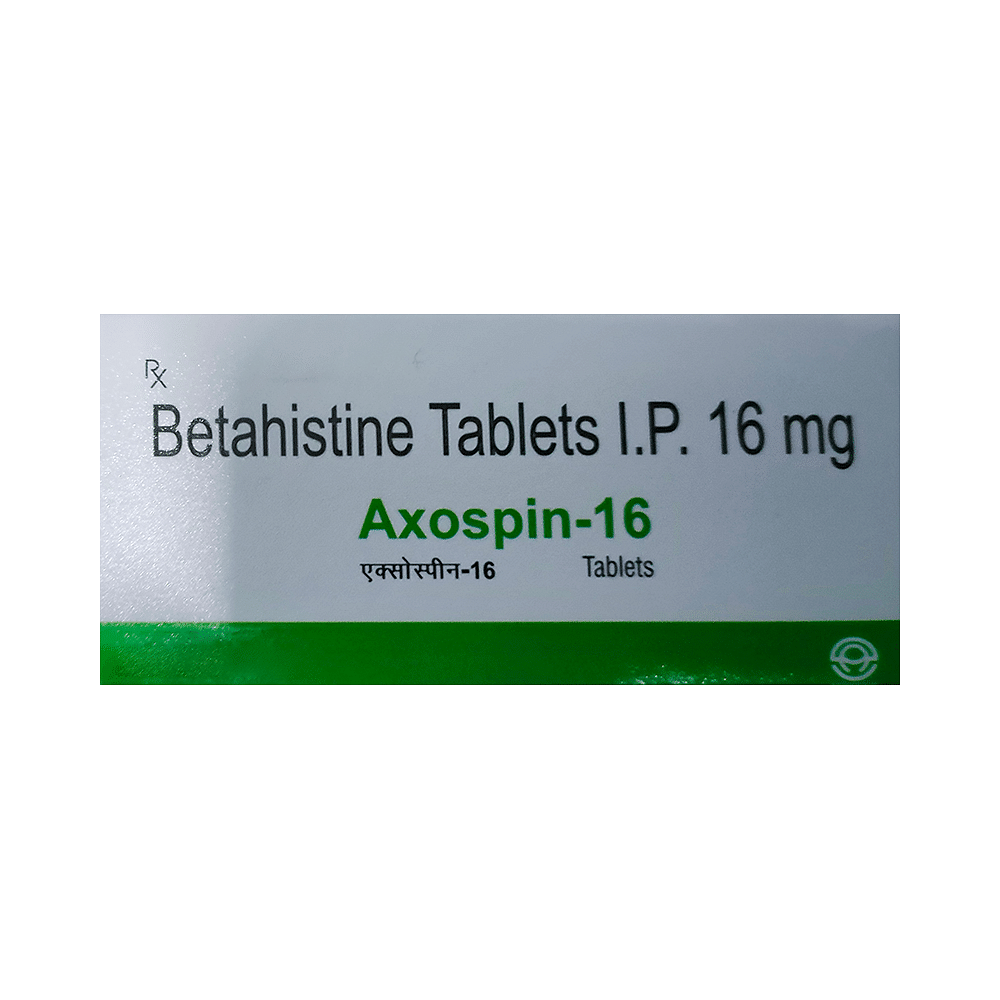
Vertiraise 16mg Tablet
Manufacturer
Megnesia Neurocare
Salt Composition
Betahistine (16mg)
Key Information
Short Description
Vertiraise 16mg Tablet is used to prevent and treat a disorder of the inner ear known as Ménière’s disease.
Dosage Form
Tablet
Introduction
Vertiraise 16mg Tablet should be swallowed whole with water and taken at the same time(s) each day to get the most benefit. Your doctor will decide what is the correct dose to relieve your symptoms and how often you need to take it. You may need to take this medicine for several months and you should take it for as long as prescribed by your doctor even if you start feeling better. The most common side effects include headache, feeling sick, and indigestion (dyspepsia). You may also get stomach pain and bloating. Taking the medicine with food can help reduce stomach problems.
Directions for Use
Take this medicine in the dose and duration as advised by your doctor. Swallow it as a whole. Do not chew, crush or break it. Vertiraise 16mg Tablet may be taken with or without food but it is better to take it at a fixed time.
Safety Information
Side Effects
headache feeling sick indigestion (dyspepsia) stomach pain bloating
Alcohol Warning
Consuming alcohol with Vertiraise 16mg Tablet does not cause any harmful side effects.
Breastfeeding Warning
Vertiraise 16mg Tablet is probably unsafe to use during breastfeeding. Limited human data suggests that the drug may pass into the breastmilk and harm the baby.
Pregnancy Warning
Vertiraise 16mg Tablet may be unsafe to use during pregnancy. Although there are limited studies in humans, animal studies have shown harmful effects on the developing baby. Your doctor will weigh the benefits and any potential risks before prescribing it to you. Please consult your doctor.
Interacting Medicines
Astemizole Azelnizine Buclizine Cetirizine
How it works
Vertiraise 16mg Tablet is a histamine analog. It works by improving the blood flow in the inner ear which reduces the pressure of excess fluid there. Excess fluid can send signals to the brain causing nausea, dizziness or spinning sensations (symptoms of Ménière's disease). Vertiraise 16mg Tablet additionally dampens down the nerve signals sent from the inner ear to the brain relieving the symptoms of Ménière's disease.
Quick Tips
You have been prescribed Vertiraise 16mg Tablet to relieve vertigo (dizziness) It can only decrease the number and severity of attacks but may not completely stop them. Take it at the same time each day to maintain a steady amount of the medicine in your body. Inform your doctor if you have a history of stomach ulcer, asthma or low blood pressure. Inform your doctor if you are pregnant, planning pregnancy or breastfeeding. Do not stop taking the medicine suddenly without talking to your doctor first.
Related Medicines

Betavert 16 Tablet

Betavert 16 Tablet

Axospin 16 Tablet

Vertin 16 Tablet

Naxivert 16mg Tablet

Bitalex 16mg Tablet

Betin 16mg Tablet

Fubeta 16 Tablet

Mivert 16mg Tablet

Bestin 16 Tablet
Frequently asked questions
What is Meniere's disease? Does it go away?
Meniere's disease is a condition affecting the inner ear, causing problems with balance and hearing. Symptoms include vertigo (dizziness), fluctuating hearing loss, tinnitus (ringing in the ears), and pressure in the affected ear. Dizziness can also lead to nausea and vomiting. Treatment for Meniere's disease varies depending on individual factors. It is essential to consult a doctor for personalized guidance regarding treatment options.
Is Vertiraise 16mg Tablet effective?
Vertiraise 16mg Tablet can be effective if used as prescribed by your doctor. Do not stop taking the medication, even if symptoms improve, as this may cause a return or worsening of symptoms.
What are the triggers for Meniere's disease?
Several factors can trigger Meniere's disease, including stress, overwork, fatigue, emotional distress, additional illnesses, and sudden changes in pressure. Certain foods like dairy products, caffeine, alcohol, and high-sodium food might also trigger symptoms. A low-salt diet (less than 2 grams/day) may help control vertigo related to Meniere's disease.
What if I forget to take a dose of Vertiraise 16mg Tablet?
If you miss a dose of Vertiraise 16mg Tablet, take it as soon as possible. However, if you are about to take the next dose, skip the missed one and only take the scheduled dose.
Is stress a reason for vertigo?
While stress alone might not cause vertigo, it can worsen existing symptoms. It's important to manage stress effectively as part of overall vertigo management.
What are the causes of vertigo?
Vertigo can be caused by a sudden drop in blood pressure, dehydration, and changes in position (like getting up quickly). Other conditions like motion sickness, certain medications, or problems with the inner ear (Meniere's disease, acoustic neuroma), can also lead to vertigo. It's important to remember that vertigo can sometimes signal other underlying health issues such as multiple sclerosis or a head injury.
How long should Vertiraise 16mg Tablet be taken?
The duration of treatment with Vertiraise 16mg Tablet varies depending on the individual. Some people find relief quickly, while others may take a longer time to respond. It is crucial to follow your doctor's prescribed dosage and wait patiently for results.
What are the common side effects of Vertiraise 16mg Tablet?
Vertiraise 16mg Tablet may cause mild digestive issues like nausea, stomach pain, bloating, and abdominal distension. It's recommended to take this medication with food to reduce the likelihood of experiencing these side effects. However, taking it with a meal might slightly decrease its absorption.
Is Vertiraise 16mg Tablet effective?
Vertiraise 16mg Tablet is potentially effective if used as prescribed by your doctor. Do not stop the medication even if you see improvement, as this may lead to symptom reoccurrence or worsening.
What if I forget to take a dose of Vertiraise 16mg Tablet?
If you miss a dose of Vertiraise 16mg Tablet, take it immediately when remembering. If it's almost time for your next dose, skip the missed one and only take the scheduled dose.
How long should Vertiraise 16mg Tablet be taken?
The duration of treatment with Vertiraise 16mg Tablet varies depending on individual responses. Some people find relief quickly, while others may require a longer time for optimal results. It is crucial to follow your doctor's prescribed dosage and wait patiently for the results.


